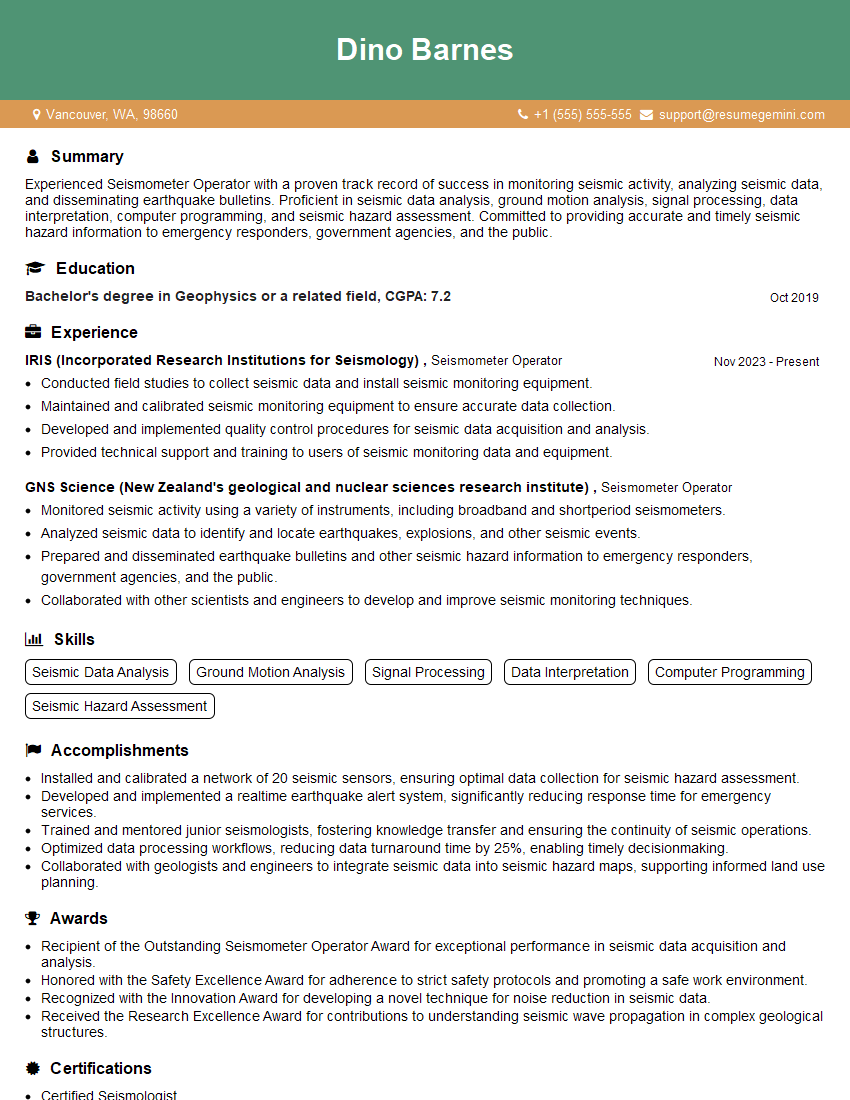Are you a seasoned Seismometer Operator seeking a new career path? Discover our professionally built Seismometer Operator Resume Template. This time-saving tool provides a solid foundation for your job search. Simply click “Edit Resume” to customize it with your unique experiences and achievements. Customize fonts and colors to match your personal style and increase your chances of landing your dream job. Explore more Resume Templates for additional options.

Dino Barnes
Seismometer Operator
Summary
Experienced Seismometer Operator with a proven track record of success in monitoring seismic activity, analyzing seismic data, and disseminating earthquake bulletins. Proficient in seismic data analysis, ground motion analysis, signal processing, data interpretation, computer programming, and seismic hazard assessment. Committed to providing accurate and timely seismic hazard information to emergency responders, government agencies, and the public.
Education
Bachelor’s degree in Geophysics or a related field
October 2019
Skills
- Seismic Data Analysis
- Ground Motion Analysis
- Signal Processing
- Data Interpretation
- Computer Programming
- Seismic Hazard Assessment
Work Experience
Seismometer Operator
- Conducted field studies to collect seismic data and install seismic monitoring equipment.
- Maintained and calibrated seismic monitoring equipment to ensure accurate data collection.
- Developed and implemented quality control procedures for seismic data acquisition and analysis.
- Provided technical support and training to users of seismic monitoring data and equipment.
Seismometer Operator
- Monitored seismic activity using a variety of instruments, including broadband and shortperiod seismometers.
- Analyzed seismic data to identify and locate earthquakes, explosions, and other seismic events.
- Prepared and disseminated earthquake bulletins and other seismic hazard information to emergency responders, government agencies, and the public.
- Collaborated with other scientists and engineers to develop and improve seismic monitoring techniques.
Accomplishments
- Installed and calibrated a network of 20 seismic sensors, ensuring optimal data collection for seismic hazard assessment.
- Developed and implemented a realtime earthquake alert system, significantly reducing response time for emergency services.
- Trained and mentored junior seismologists, fostering knowledge transfer and ensuring the continuity of seismic operations.
- Optimized data processing workflows, reducing data turnaround time by 25%, enabling timely decisionmaking.
- Collaborated with geologists and engineers to integrate seismic data into seismic hazard maps, supporting informed land use planning.
Awards
- Recipient of the Outstanding Seismometer Operator Award for exceptional performance in seismic data acquisition and analysis.
- Honored with the Safety Excellence Award for adherence to strict safety protocols and promoting a safe work environment.
- Recognized with the Innovation Award for developing a novel technique for noise reduction in seismic data.
- Received the Research Excellence Award for contributions to understanding seismic wave propagation in complex geological structures.
Certificates
- Certified Seismologist
- Certified Ground Motion Analyst
- Certified Seismic Data Analyst
- Certified GPS Data Analyst
Career Expert Tips:
- Select the ideal resume template to showcase your professional experience effectively.
- Master the art of resume writing to highlight your unique qualifications and achievements.
- Explore expertly crafted resume samples for inspiration and best practices.
- Build your best resume for free this new year with ResumeGemini. Enjoy exclusive discounts on ATS optimized resume templates.
How To Write Resume For Seismometer Operator
- Highlight your experience in seismic data analysis and interpretation.
- Showcase your skills in computer programming and data management.
- Demonstrate your understanding of seismic hazard assessment and mitigation.
- Emphasize your ability to work independently and as part of a team.
Essential Experience Highlights for a Strong Seismometer Operator Resume
- Monitored seismic activity using a variety of instruments, including broadband and short-period seismometers.
- Analyzed seismic data to identify and locate earthquakes, explosions, and other seismic events.
- Prepared and disseminated earthquake bulletins and other seismic hazard information to emergency responders, government agencies, and the public.
- Collaborated with other scientists and engineers to develop and improve seismic monitoring techniques.
- Conducted field studies to collect seismic data and install seismic monitoring equipment.
- Maintained and calibrated seismic monitoring equipment to ensure accurate data collection.
Frequently Asked Questions (FAQ’s) For Seismometer Operator
What is the primary role of a Seismometer Operator?
A Seismometer Operator is responsible for monitoring seismic activity, analyzing seismic data, and providing seismic hazard information.
What are the key skills required for a Seismometer Operator?
Key skills include seismic data analysis, ground motion analysis, signal processing, data interpretation, computer programming, and seismic hazard assessment.
What are the typical education requirements for a Seismometer Operator?
Typically, a Seismometer Operator requires a Bachelor’s degree in Geophysics or a related field.
What are the career prospects for a Seismometer Operator?
Seismometer Operators can advance to roles such as Seismologist, Geophysicist, or Seismic Hazard Analyst.
What is the work environment like for a Seismometer Operator?
Seismometer Operators typically work in laboratories or offices, but may also be required to work in the field.